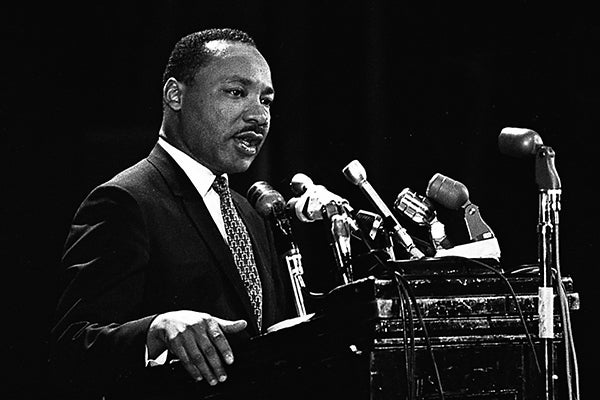|
January 10, 2014
Stanford scholar: Global struggle continues for social justice, human rights
Clayborne Carson, an expert on Martin Luther King Jr., explores what the late civil rights leader would think about social and economic justice in today's world – and how to bridge the gap in inequality. On Jan. 15, the Martin Luther King, Jr., Research and Education Institute will hold its annual open house to celebrate King's vision. By Clifton B. Parker

Martin Luther King Jr. speaking in Stanford's Memorial Auditorium in 1967 (Photo: Chuck Painter / Stanford News Service)
As the nation prepares to celebrate the birthday of Martin Luther King Jr. on Jan. 20, Stanford historian Clayborne Carson reminds us that King's vision is unfulfilled – especially in the global struggle for human rights and peace.
"Martin realized that the black struggle in the 1960s was about more than civil rights," said Carson, director of Stanford's Martin Luther King, Jr., Research and Education Institute and the foremost King scholar. "He was concerned about expanding human rights – rather than merely civil rights – in the 21st century. This would be the culmination of King's vision, but we are a long way away from achieving this."
On Jan. 15, the institute will hold its annual open house at its campus offices in Cypress Hall D, 466 Via Ortega. The event, which features a unique display of historical photographs and documents, will take place from 4 to 6 p.m. It is free and open to the public.
Under Carson's direction, the King Papers Project, a component of the institute, is now publishing the seventh of a planned 14-volume series of the civil right leader's correspondence, sermons, speeches, writings and unpublished manuscripts.
The continuing crisis
Carson said that the right to pursue economic opportunity by crossing national borders is one of the flashpoints in today's inequality.
"The Declaration of Independence speaks of universal, inalienable rights. But we have only begun to define what rights we have regardless of where we choose to live," he said.
King, in his 1964 Nobel Peace Prize speech, said he sought to overcome racial injustice and build a world where everyone could enjoy "three meals a day for their bodies, education and culture for their minds and dignity, equality and freedom for their spirits."
But as Carson points out, millions of people today are held back from countless opportunities because they are not official citizens. He said that while it is relatively easy for a high-tech worker without U.S. citizenship to enjoy a prosperous career in the Silicon Valley, it is dangerous and deemed illegal for a Mexican migrant worker to cross into the United States without the proper documents.
"There are thousands of people in this area who are living in fear because they did what my parents and grandparents did – that is, migrate in search of better opportunities. No country in the world wants to put out a welcome mat for the poor," he said.
Citizenship rights are those backed by a particular government and political system – such as the Bill of Rights or the Declaration of Independence in the United States – but human rights are a more universal, global concept, Carson said. The ideal, he said, would be for everyone in the world to have the same protections and rights as a human being.
"Maybe in 100 years we will have an answer," he said.
The two decades after World War II saw progress on issues like eliminating legalized racial discrimination, but there are still major obstacles to equal opportunity, Carson said.
King, for example, believed that "international violence" was one of the three major issues of modern times, along with racial oppression and poverty, Carson said.
Wars of the past half-century have been fought mainly in "undeveloped countries with weapons from the developed world." These wars produce a lot of "collateral damage," especially for poor people who don't have the means to leave war zones, he added.
King, said Carson, would be a staunch critic of any nation that tolerated extensive poverty while wasting precious human and material resources on war.
"He would want people to know that his dream was still unfulfilled at the end of his life and remains unrealized even now," he said.
-30-
|